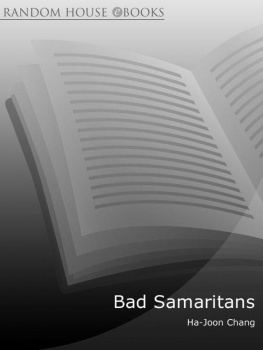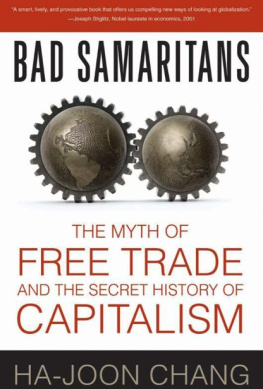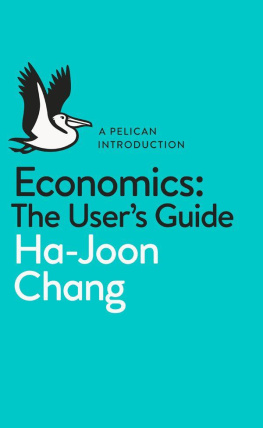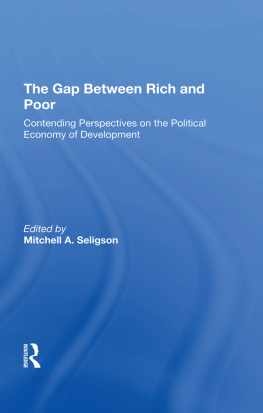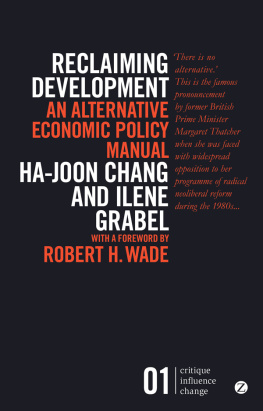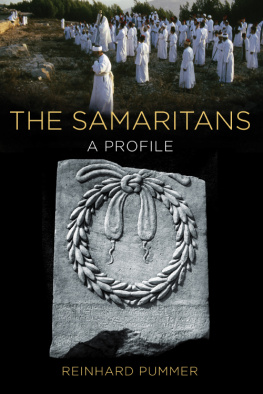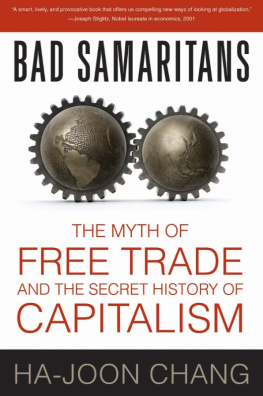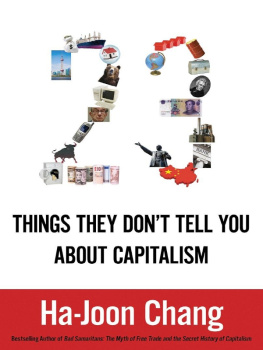Ha-Joon Chang - Bad Samaritans: Rich Nations, Poor Policies and the Threat to the Developing World
Here you can read online Ha-Joon Chang - Bad Samaritans: Rich Nations, Poor Policies and the Threat to the Developing World full text of the book (entire story) in english for free. Download pdf and epub, get meaning, cover and reviews about this ebook. year: 2008, publisher: Random House Business Books, genre: Politics. Description of the work, (preface) as well as reviews are available. Best literature library LitArk.com created for fans of good reading and offers a wide selection of genres:
Romance novel
Science fiction
Adventure
Detective
Science
History
Home and family
Prose
Art
Politics
Computer
Non-fiction
Religion
Business
Children
Humor
Choose a favorite category and find really read worthwhile books. Enjoy immersion in the world of imagination, feel the emotions of the characters or learn something new for yourself, make an fascinating discovery.
- Book:Bad Samaritans: Rich Nations, Poor Policies and the Threat to the Developing World
- Author:
- Publisher:Random House Business Books
- Genre:
- Year:2008
- Rating:4 / 5
- Favourites:Add to favourites
- Your mark:
- 80
- 1
- 2
- 3
- 4
- 5
Bad Samaritans: Rich Nations, Poor Policies and the Threat to the Developing World: summary, description and annotation
We offer to read an annotation, description, summary or preface (depends on what the author of the book "Bad Samaritans: Rich Nations, Poor Policies and the Threat to the Developing World" wrote himself). If you haven't found the necessary information about the book — write in the comments, we will try to find it.
Bad Samaritans: Rich Nations, Poor Policies and the Threat to the Developing World — read online for free the complete book (whole text) full work
Below is the text of the book, divided by pages. System saving the place of the last page read, allows you to conveniently read the book "Bad Samaritans: Rich Nations, Poor Policies and the Threat to the Developing World" online for free, without having to search again every time where you left off. Put a bookmark, and you can go to the page where you finished reading at any time.
Font size:
Interval:
Bookmark:
Its rare that a book appears with a fresh perspective on world affairs, but Ha-Joon Chang has some startlingly original things to say about globalization. In theory, he argues, the worlds wealthiest countries and major institutions, such as the IMF and World Bank, want to see all nations become modern, thriving societies. In practice, though, those at the top are kicking away the ladder to wealth that they themselves climbed.
In the course of his expos Chang reveals double standards at work everywhere: in policy-makers understanding of history, in their attitudes to such key issues as free trade and foreign investment, and in their baffling prejudices about national stereotypes and ideal forms of government. He shows precisely why these double standards have become so deeply embedded, and how they have damaged and continue to damage the developing world. And he convincingly demonstrates how a fairer and more prosperous global economy could be created if only the Bad Samaritans would accept the evidence that is actually staring them in the face.
Ha-Joon Chang is a Cambridge economist who, for the past two decades, has taught and researched issues related to economic development and globalisation. He has also worked as a consultant for the World Bank, the Asian Development Bank, various UN agencies and for the governments of Brazil, Canada, Japan, South Africa, the UK, and Venezuela. He has published numerous articles and books, including Kicking Away the Ladder Development Strategy in Historical Perspective, which won the 2003 Myrdal Prize and has been translated into seven languages. In 2005, he and Richard Nelson of Columbia University received the Leontief Prize, whose previous winners include John Kenneth Galbraith and Amartya Sen. He has been on the editorial board of the Cambridge Journal of Economics since 1992.
Mozambiques economic miracle
How to escape poverty
Myths and facts about globalization
How did the rich countries become rich?
Is free trade always the answer?
Should we regulate foreign investment?
Private enterprise good, public enterprise bad?
Is it wrong to borrow ideas?
Can financial prudence go too far?
Should we turn our backs on corrupt and undemocratic countries?
Are some cultures incapable of economic development?
So Paulo, October 2037
Can things get better?
The Guilty Secrets of Rich Nations and
the Threat to Global Prosperity

This eBook is copyright material and must not be copied, reproduced, transferred, distributed, leased, licensed or publicly performed or used in any way except as specifically permitted in writing by the publishers, as allowed under the terms and conditions under which it was purchased or as strictly permitted by applicable copyright law. Any unauthorised distribution or use of this text may be a direct infringement of the authors and publishers rights and those responsible may be liable in law accordingly.
Version 1.0
Epub ISBN 9781407005324
www.randomhouse.co.uk
Published by Random House Business Books 2008
2 4 6 8 10 9 7 5 3 1
Copyright Ha-Joon Chang 2007
Ha-Joon Chang has asserted his right under the Copyright, Designs and Patents Act 1988 to be identified as the author of this work
This book is sold subject to the condition that it shall not, by way of trade or otherwise, be lent, resold, hired out, or otherwise circulated without the publishers prior consent in any form of binding or cover other than that in which it is published and without a similar condition, including this condition, being imposed on the subsequent purchaser
First published in Great Britain in 2007 by
Random House Business Books
Random House, 20 Vauxhall Bridge Road,
London SW1V 2SA
www.rbooks.co.uk
Addresses for companies within The Random House Group Limited can be found at: www.randomhouse.co.uk/offices.htm
The Random House Group Limited Reg. No. 954009
A CIP catalogue record for this book is available from the British Library
ISBN 9781905211371
To Hee-Jeong
The idea of writing an accessible book on globalization and development that is critical of the reigning orthodoxy first came from Duncan Green a few years ago. He convinced me that I have some unusual and interesting things to say on these topics and, therefore, that I should put them together for an audience that is much bigger than the one I usually write for. Initially, we were going to write the book together, combining his long-time experience as an NGO activist and my academic research, to produce something that has both a solid academic foundation and campaign flair. In the event, Duncan became the head of research at Oxfam and had to withdraw from the project due to his workload. But later, when I started to write the book on my own, he very kindly read all the chapters of the book (often more than one version of them) and provided me with insightful comments, both substantively and editorially. He also graciously put up with me ringing him up without warning to thrash out my ideas. I deeply thank him for his generosity, wisdom and patience.
When Duncan withdrew, the project lost its propeller and drifted rather aimlessly for a while. I became busy with other things and, more importantly, it was not easy to make the existence of my project known to the relevant publishers. Then Richard Toye kindly introduced me to Ivan Mulcahy, my literary agent. Ivan had a vision how to turn an undeveloped semi-academic treatise into a genuinely accessible book and taught me a lot of things in the art of writing for a wider audience. His colleague Jonathan Conway at Mulcahy & Viney also provided critical input in shaping the project.
In formulating the book, I benefited tremendously from discussions with Chris Cramer. He has always been a generous friend, but the intellectual energy he invested in helping me shape this book was exceptional even by his own high standards. Richard Toye not only introduced me to my literary agent but also provided very helpful comments on overall structure and some of the individual arguments of the book. Deepak Nayyar took time out from his busy schedule to go through my initial proposal and gave me a lot of sagacious comments. In developing the book, I have also benefited from discussions with Dean Baker, Jonathan di John, Barbara Harriss-White, Peter Nolan, Gabriel Palma, Bob Rowthorn, Ajit Singh, Rosemary Thorp, John Toye and Mark Weisbrot.
As I was writing the chapters, I received useful comments from a number of people. My sometime co-author, Ilene Grabel, read all the chapters and gave me very important feedback. Robert Molteno not only read all the chapters and gave me wonderful editorial advice but also provided useful comments. Peter Beattie, Shailaja Fennell, Elias Khalil, Amy Klatzkin, Kangkook Lee, Chris Pallas, Richard Schmale and Sarah Wood read earlier versions of some of the chapters and gave me helpful suggestions.
The book would not have had the richness of information without the help of three very able research assistants. Luba Fakrhutdinova was on call to provide help with all aspects of the book, especially data work. Hassan Akram excavated a lot of wonderful historical material for the culture chapter and also offered helpful comments on some of the other chapters. Ariane McCabe did a great job in finding material for a number of chapters, especially the chapter on intellectual property rights, on which she also provided useful comments. I would also like to thank Luiz de Andrade Filho and Kenia Parsons for their assistance.
Font size:
Interval:
Bookmark:
Similar books «Bad Samaritans: Rich Nations, Poor Policies and the Threat to the Developing World»
Look at similar books to Bad Samaritans: Rich Nations, Poor Policies and the Threat to the Developing World. We have selected literature similar in name and meaning in the hope of providing readers with more options to find new, interesting, not yet read works.
Discussion, reviews of the book Bad Samaritans: Rich Nations, Poor Policies and the Threat to the Developing World and just readers' own opinions. Leave your comments, write what you think about the work, its meaning or the main characters. Specify what exactly you liked and what you didn't like, and why you think so.

